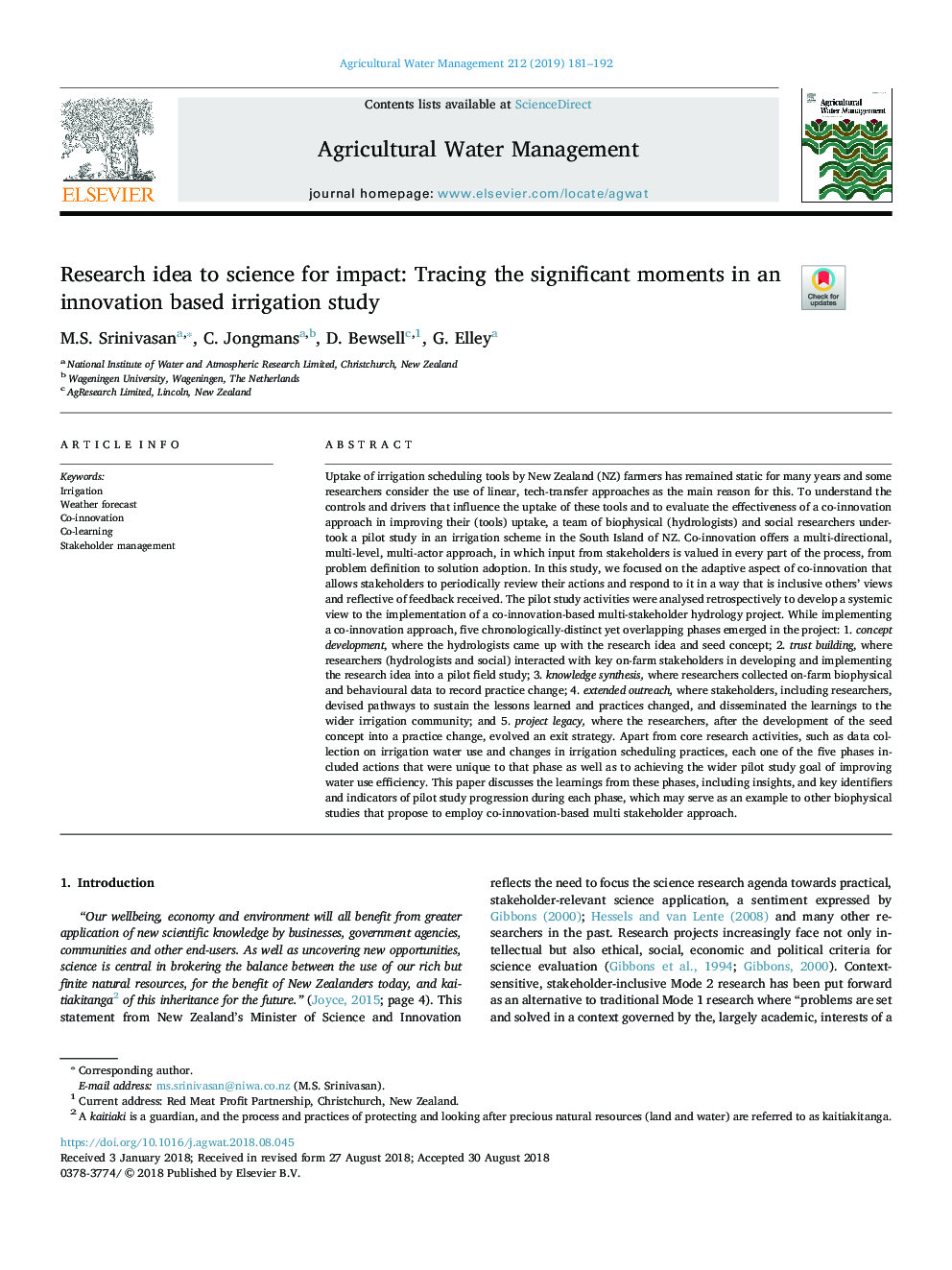| کد مقاله | کد نشریه | سال انتشار | مقاله انگلیسی | نسخه تمام متن |
|---|---|---|---|---|
| 10144782 | 1646309 | 2019 | 12 صفحه PDF | دانلود رایگان |
عنوان انگلیسی مقاله ISI
Research idea to science for impact: Tracing the significant moments in an innovation based irrigation study
ترجمه فارسی عنوان
ایده تحقیق به علم برای تأثیر: ردیابی لحظات مهمی در یک مطالعه آبیاری مبتنی بر نوآوری
دانلود مقاله + سفارش ترجمه
دانلود مقاله ISI انگلیسی
رایگان برای ایرانیان
کلمات کلیدی
آبیاری، پیش بینی آب و هوا، همکاری نوآوری، همکاری یادگیری، مدیریت ذینفع،
موضوعات مرتبط
علوم زیستی و بیوفناوری
علوم کشاورزی و بیولوژیک
علوم زراعت و اصلاح نباتات
چکیده انگلیسی
Uptake of irrigation scheduling tools by New Zealand (NZ) farmers has remained static for many years and some researchers consider the use of linear, tech-transfer approaches as the main reason for this. To understand the controls and drivers that influence the uptake of these tools and to evaluate the effectiveness of a co-innovation approach in improving their (tools) uptake, a team of biophysical (hydrologists) and social researchers undertook a pilot study in an irrigation scheme in the South Island of NZ. Co-innovation offers a multi-directional, multi-level, multi-actor approach, in which input from stakeholders is valued in every part of the process, from problem definition to solution adoption. In this study, we focused on the adaptive aspect of co-innovation that allows stakeholders to periodically review their actions and respond to it in a way that is inclusive others' views and reflective of feedback received. The pilot study activities were analysed retrospectively to develop a systemic view to the implementation of a co-innovation-based multi-stakeholder hydrology project. While implementing a co-innovation approach, five chronologically-distinct yet overlapping phases emerged in the project: 1. concept development, where the hydrologists came up with the research idea and seed concept; 2. trust building, where researchers (hydrologists and social) interacted with key on-farm stakeholders in developing and implementing the research idea into a pilot field study; 3. knowledge synthesis, where researchers collected on-farm biophysical and behavioural data to record practice change; 4. extended outreach, where stakeholders, including researchers, devised pathways to sustain the lessons learned and practices changed, and disseminated the learnings to the wider irrigation community; and 5. project legacy, where the researchers, after the development of the seed concept into a practice change, evolved an exit strategy. Apart from core research activities, such as data collection on irrigation water use and changes in irrigation scheduling practices, each one of the five phases included actions that were unique to that phase as well as to achieving the wider pilot study goal of improving water use efficiency. This paper discusses the learnings from these phases, including insights, and key identifiers and indicators of pilot study progression during each phase, which may serve as an example to other biophysical studies that propose to employ co-innovation-based multi stakeholder approach.
ناشر
Database: Elsevier - ScienceDirect (ساینس دایرکت)
Journal: Agricultural Water Management - Volume 212, 1 February 2019, Pages 181-192
Journal: Agricultural Water Management - Volume 212, 1 February 2019, Pages 181-192
نویسندگان
M.S. Srinivasan, C. Jongmans, D. Bewsell, G. Elley,
